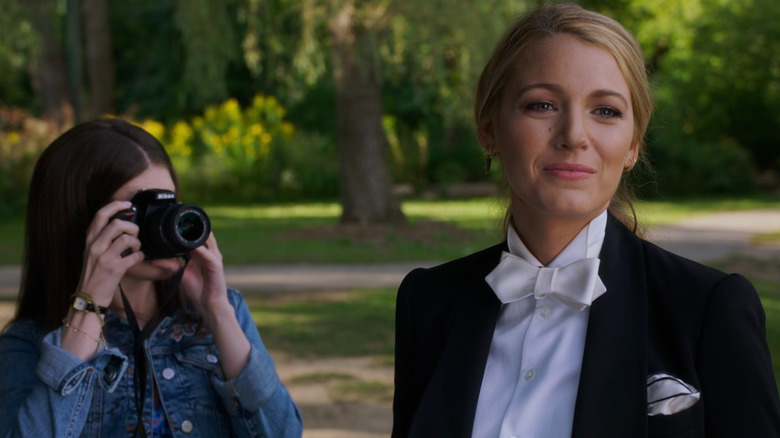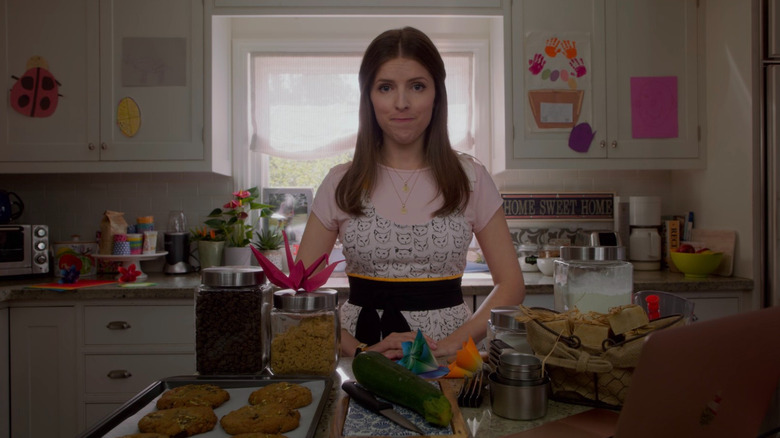The Daily Stream: A Simple Favor Is A Complicated, Decadent Mystery
(Welcome to The Daily Stream, an ongoing series in which the /Film team shares what they've been watching, why it's worth checking out, and where you can stream it.)
The Movie: "A Simple Favor"
Where You Can Stream It: Prime Video
The Pitch: "A Simple Favor" poses a very (appropriately) simple question: what if Phillip Marlowe was a suburban single mom with a vlog? You'd get Stephanie Smothers (Anna Kendrick), best friend to Emily Nelson (Blake Lively) who went missing after asking Stephanie for, you guessed it, a simple favor. In the aftermath of Emily's disappearance, Stephanie takes it upon herself to find her bestie, which leads her down a dark path littered with secrets, some of which are her own.
Emily Nelson works as a PR executive for a high-end fashion designer with an attitude, Dennis Nylon, and she knows how to handle him (and others like him). "You've gotta go right at 'em, especially the powerful ones," she tells Stephanie, "or they will f*** you in the face." Her style is truly iconic and she captivates every room the second she struts in. She's married to one-hit-wonder author Sean Townsend (Henry Golding) and they have their son, Nicky (Ian Ho).
Stephanie Smothers, a widow, is the poster child for perfect suburban moms: signs up for whatever extracurricular things she can help out with, makes her son, Miles (Joshua Satine), lobster bisque for lunch, has her own helium tank ("Do you not have one? Are you a bad parent?"). She makes June Cleaver look lazy. She also prides herself on the cute socks she got at Target and the home remedies she shares on her popular (if readily mocked) mommy vlog, "Hi Moms!"
Miles and Nicky are friends in the same class and serve as the jumping-off point for their mothers' complicated friendship.
Why it's essential viewing
Paul Feig's sexy, campy neo-noir puts two femme fatales at its center while adding the flare for the dramatic of film noir classics like Otto Preminger's "Laura." It combines Feig's comedic strengths with effortless sex appeal and allure, making for a sensationally entertaining and enticing mystery. It also happens to be wickedly stylish and Emily has a wardrobe that's to die for. It's also delightfully queer in more ways than I can count, which automatically makes it pure gold in my books.
"A Simple Favor" plays with some of the key devices of film noir that often get overlooked. Like "Laura" and "Out Of The Past" (as just two examples), it starts in the present, then recaps the story thus far through the use of flashbacks. It also pulls from other noir classics like "Citizen Kane" and "Double Indemnity" with the first-person narration, only in Feig's adaptation of Darcy Bell's novel, the first-person narration is done via mommy vlog (or blog in the book). Emily is our Phyllis Dietrichson, Vivian Rutledge, Kathie Moffat, or Waldo Lydecker while Stephanie is our Det. Lt. Mark McPherson, the aforementioned Marlowe, Jeff Bailey/Markham, or Walter Neff. Except, instead of falling prey to the femme fatale, Stephanie is one and solves the mystery while living to vlog about it.
The perfect femme fatale
It makes sense, really, that Feig would gravitate towards something that's at once rooted in classic cinema while also deviating entirely from convention. The man may be one of the most stylish people in the industry, exclusively wearing suits pretty much at all times (or almost, anyway). He also makes movies about women where they crap themselves in the middle of the street in expensive wedding attire. Truly, he contains multitudes, as "A Simple Favor" proves. Feig takes everything we know about noir and flips it on its head while making it superbly queer in all the best ways. While the Hays Code made queerbaiting more prominent throughout classic cinema by virtue of making queer conduct completely taboo, Feig flips the script, treating Emily's queerness as canonical and queer behavior as sacrosanct.
Blake Lively plays with gender norms by having Emily dress in men's clothing with flawless feminine touches (she was actively involved in coming up with her character's wardrobe) while Anna Kendrick plays Stephanie like the perfect suburban mom but adds just the right touch of repressed sexuality and darkness. Stephanie is drawn to Emily in part because she wants to be friends with her but also because she wants to be her and because she kind of just wants her. But that's Emily's gift; she's a compulsive liar and sociopath with more charm and sex appeal than any one human should be allowed to possess, which makes her intoxicating and lethal. She's the perfect femme fatale, and she knows exactly what she's doing.
'Prudes are people, too'
Stephanie, meanwhile, is the best parts of all the aforementioned male protagonists with one very specific advantage: she's a woman. So while she may be captivated by Emily, while she may lust after her and her life, or even just her confidence, she has the wherewithal and unfortunately terrible life experience that lets her smell bulls*** a mile away and keeps her from getting distracted by desire. There's a unique advantage to not only making your protagonists women but hiring women to write them, as the novel was written by Bell and the screenplay was adapted by Jessica Sharzer. They may be over-the-top, but they still feel like real people as opposed to some male fantasy that breasted boobily.
Now, to be sure, just because you're a woman doesn't mean you can write convincing female characters. However, men have been given enough swings at bat by now with some seriously questionable payoffs, so it's a breath of fresh air to get characters like this that weren't written by a fetishistic dude. Everything is written from the female gaze and shot with the female gaze in mind, and it lets women be sexual, devious, complicated characters without making it an uncomfortable kink or the basis of a man's pleasure. The men in this movie are secondary, like the arm candy that so many women were reduced to in the heyday of film noir. Frankly, I think Henry Golding makes a perfect gender-swapped surrogate for the perpetual wife a la Mildred Pierce. Meanwhile, Emily and Stephanie represent two of the most archetypal female characters in noir that often play second fiddle to the main character: "the exciting, childless whores, or the boring, potentially childbearing sweethearts." Paul Feig gave us women who could do both and so much more.



